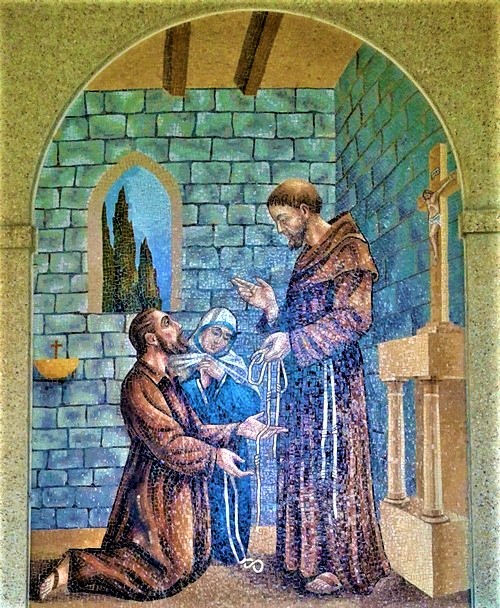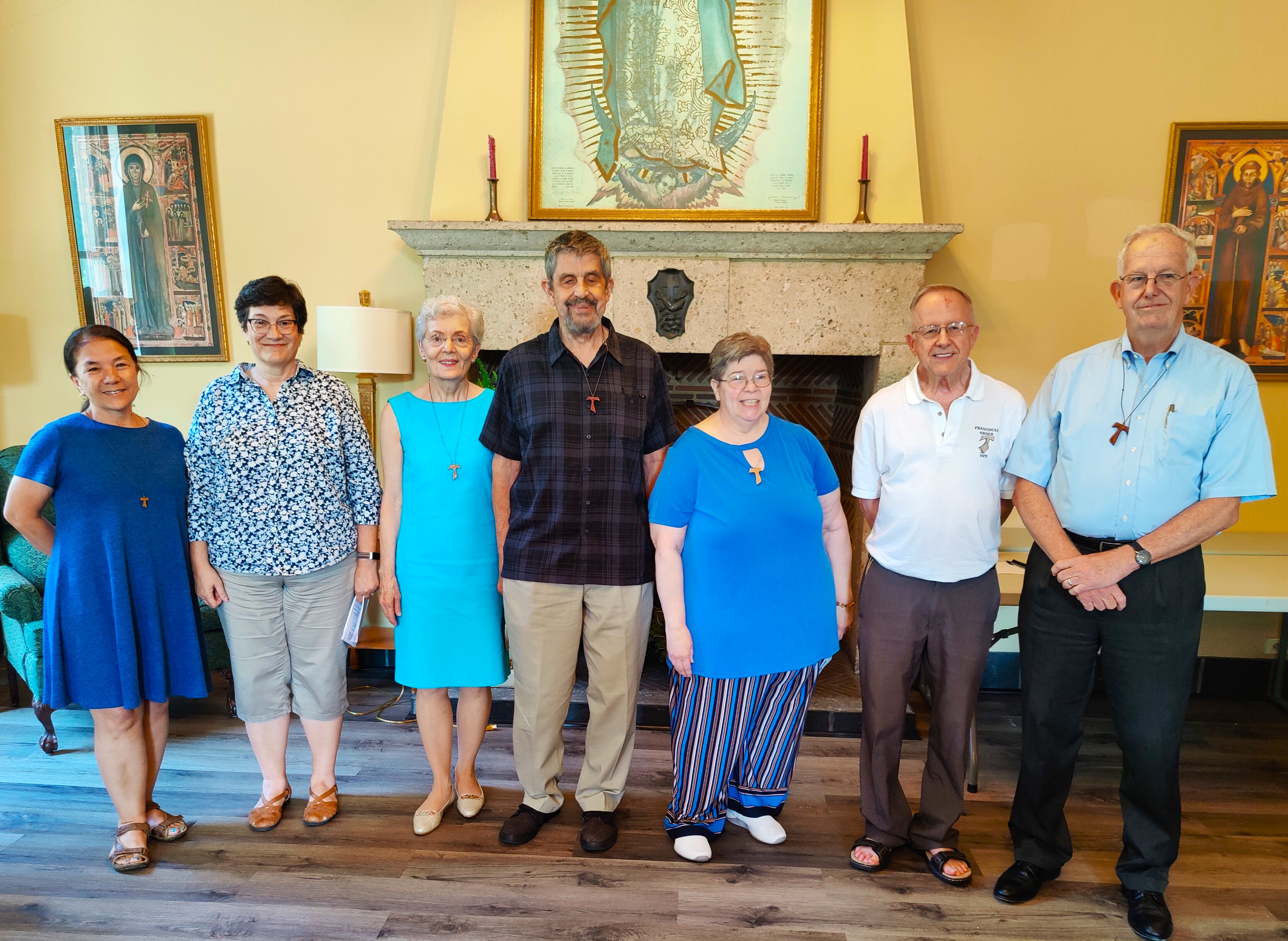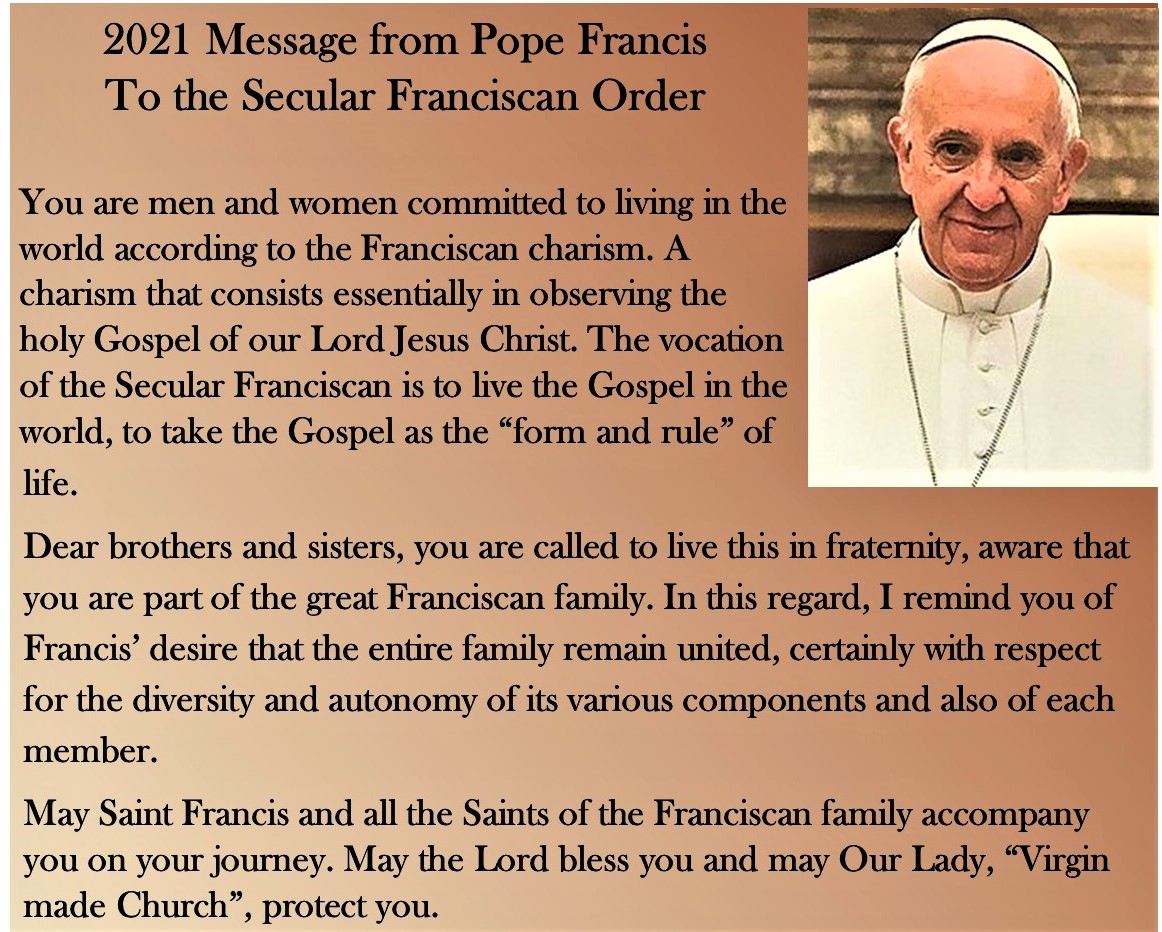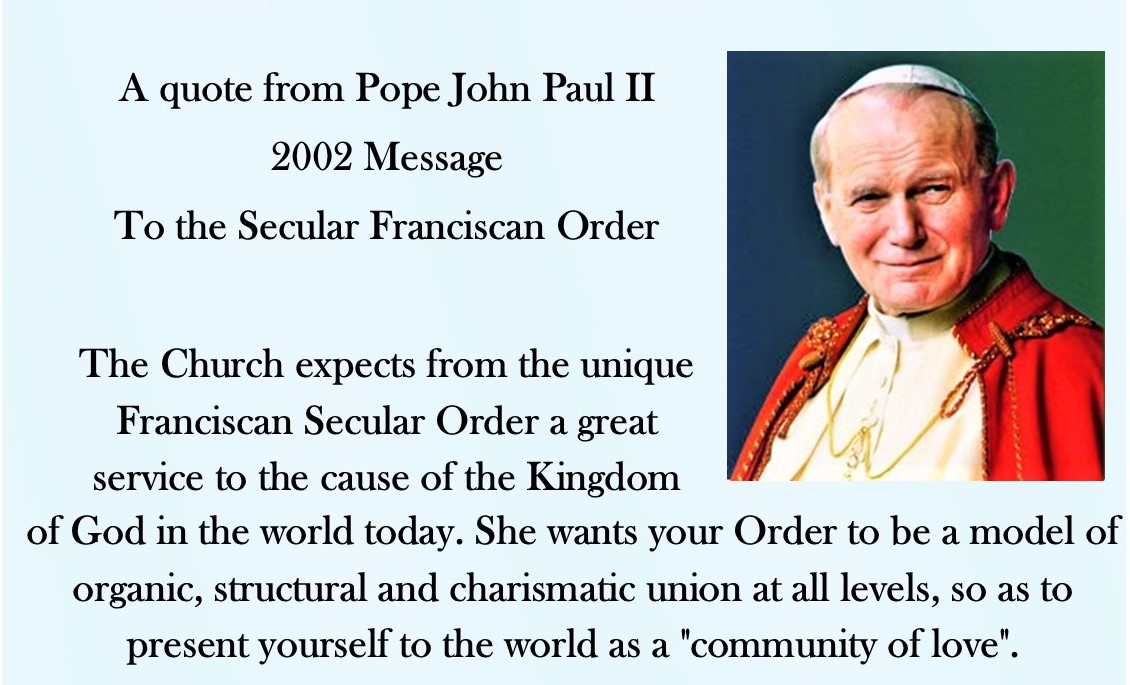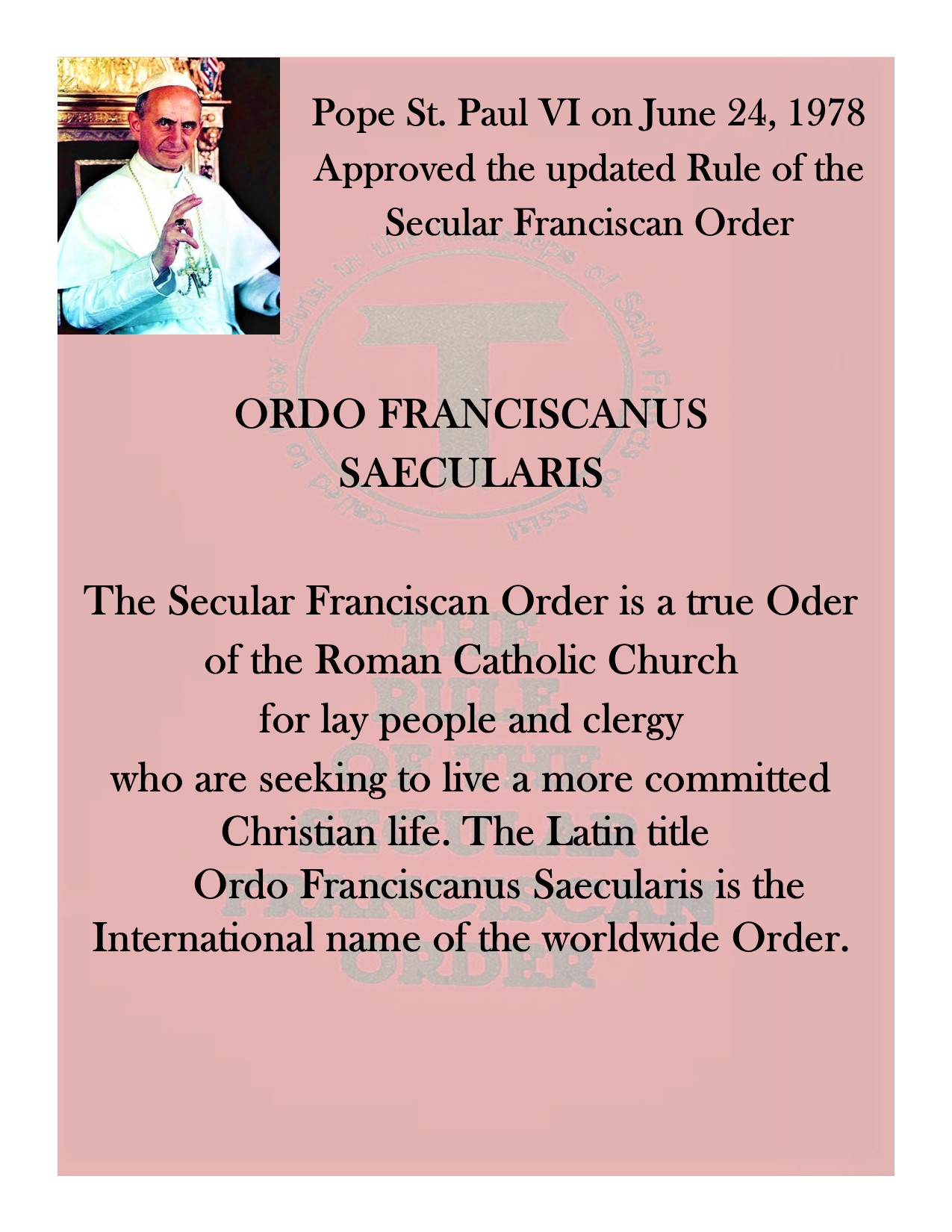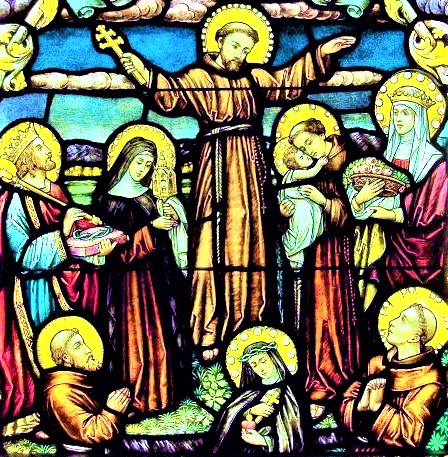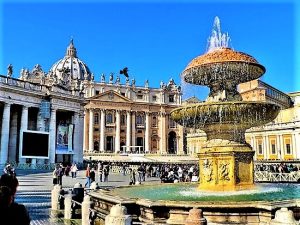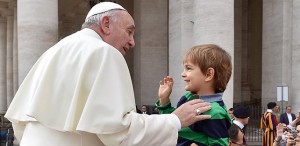****************************************
Vatican News Service
****************************************
Pope Francis Visits Greccio
Vatican City, 5 January 2016 (VIS) – In the late morning Pope Francis traveled by car to the shrine of Greccio, arriving shortly before 3 p.m. He went to Greccio to emphasize, “touch”, as the representation of the Nativity wanted by the saint whose name it bears was a way to make more concretely close to the most needy and destitute – which are at the center of the pontificate of Pope Francis – “We too, not just the richest, could – could – build, build a crib”.
The Pope had expressed the desire to learn more about Greccio and the place from which the crib has spread worldwide thanks to St. Francis. So in response to a secret invitation, just before Christmas, by the bishop, the Holy Father made a surprised visit to the shrine. Pope Francis said he wanted to come to enter the place of the first performance of the nativity scene that took place in 1223.
Before going to the shrine, the Pope met with a group of 150 young people who were having a meeting of the diocese: surprise came from the back of the room when he entered. We met for about 10 minutes, speaking extemporaneously between wide-eyed youth that never would have imagined having him so close.
Francis spoke to the young people of the star that expresses the choices to be made. He also pointed out that we all need a star to follow. Then he referred to the Baby Jesus that is the sign of God’s humility but also a clear indication of travel to those who are smaller, helpless and marginalized. Finally, he took some selfies. Everything happened in a dimension very familiar, it was very beautiful and intense, said the bishop in Greccio.
The Franciscan friars were amazed by the arrival of “the Pontiff” – revealed to Tv2000 Father Alfredo Silvestri, guardian of the sanctuary of Greccio – we were not prepared. At that moment I did not have my habit on and went quickly to fine one.
Father Alfredo Silvestri went to the shrine to open the gate for the Pope. The Pope was intrigued by this place, so remote, and lived very intensely the moment of the physical with this ancient space, enjoying himself for a few moments in silence in front of the medieval fresco depicting St. Francis with the next fresco of the Virgin Mary breastfeeding the baby Jesus. The Pope remained silent for a long time staring at this fresco. The most beautiful scene is when Francis kissed the altar where every morning we celebrate the Eucharist. It was a moving gesture, said Father Alfredo Silvestri.
****************************************
Two Secular Franciscans Canonized
Blessed Louis Martin, OFS and Zelie Martin, OFS Will Be the First Married Couple Canonized Together
“Thanks be to God, two spouses, parents of Saint Therese of Lisieux, were canonized, Saints are not only priests and nuns, but also laypeople,” pointed out Cardinal Amato, referring to this exemplary French married couple.
Married in 1858, they had nine children, five of whom followed the religious life.
The 218 letters that are kept of Zelie, written from 1863 until her death in 1877, record the rhythm of life with the War of 1870, the economic crises, and the births and death of their four babies.
As Secular Franciscans they attended daily Mass at 5:30 am, Angelus and Vespers, rest on Sundays, fasting during Lent.
They invited poor people to dine in their home and they visited the elderly. They also taught their daughters to treat the underprivileged as equals. Zelie died of a very painful cancer at 46. Louis was left with five very young daughters: Marie, Pauline, Leonie, Celine, and Therese, who was only four and a half years old but who always remembered her Mother as a Saint. Louis died in 1894, after suffering a serious mental illness.
Pope Benedict XVI beatified both parents on October 19, 2008. Their canonization was the first joint canonization of a married couple. Many have proposed their life of daily holiness as a model for our time.
St. John Paul II proclaimed Saint Therese of Lisieux a Doctor of the Church in 1997.
****************************************
Pope to new cardinals: always remember St. Francis, who was not afraid to embrace the leper
“We always remember the image of St. Francis, who was not afraid to embrace the leper and to welcome those who suffer any kind of marginalization. In fact, dear brothers, the gospel of the marginalized, is played and it turns out and proves our credibility. Here is the testing ground of an authentic Christian life and shows with determination on the path of his Church welcoming and out: the gospel of the marginalized, lived by the Holy man of Assisi, and the choice of the logic of love against the temptations of fear, and the closure of self-restraint.
See Christ in every person marginalized, again recalling the example of St. Francis, Pope Francis urged the cardinals “to serve the crucified Jesus in every person marginalized, for whatever reason; to see the Lord at all excluded person who is hungry, thirsty, or is naked; the Lord who is present even in those who have lost their faith, or who have strayed from living their faith or who declare themselves atheists; the Lord who is in jail, who is sick, who did not work, who is persecuted, the Lord who is in the leper – in body or soul – which is discriminated against! We do not discover the Lord if we do not welcome in an authentic way of the marginalized. “
****************************************
Pope Francis’ Prayer to Mary
Mary, Virgin and Mother,
you who, moved by the Holy Spirit,
welcomed the word of life
in the depths of your humble faith:
as you gave yourself completely to the Eternal One,
help us to say our own “yes”
to the urgent call, as pressing as ever,
to proclaim the good news of Jesus.Filled with Christ’s presence,
you brought joy to John the Baptist,
making him exult in the womb of his mother.
Brimming over with joy,
you sang of the great things done by God.Standing at the foot of the cross
with unyielding faith,
you received the joyful comfort of the resurrection,
and joined the disciples in awaiting the Spirit
so that the evangelizing Church might be born.Obtain for us now a new ardour born of the resurrection,
that we may bring to all the Gospel of life
which triumphs over death.
Give us a holy courage to seek new paths,
that the gift of unfading beauty may reach every man and woman.Virgin of listening and contemplation,
Mother of love, Bride of the eternal wedding feast,
pray for the Church,
whose pure icon you are,
that she may never be closed in on herself
or lose her passion for establishing God’s kingdom.Star of the new evangelization,
help us to bear radiant witness to communion, service, ardent and generous faith,
justice and love of the poor,
that the joy of the Gospel
may reach to the ends of the earth, illuminating even the fringes of our world.Mother of the living Gospel,
wellspring of happiness for God’s little ones, pray for us.
Amen. Alleluia!
Angelus: Deafness to the voice of the Holy Spirit leads to muteness in Evangelization
Vatican City, 11 January 2014 (VIS) – The feast of the Baptism of the Lord concludes the season of the Nativity and the Pope, during the Angelus at midday today, commenting on the passage in the Gospel of St. Mark – when the heavens open at the moment at which John the Baptist baptizes Jesus in the Jordan – affirmed that this event marks the end of “the time of the closed heavens, which indicated the separation of God and man as a consequence of sin”.
Sin “alienates us from God and ruptures the bond between earth and heaven, causing misery and failure in our lives. The open heavens indicate that God has given His grace so that the earth may bear His fruit. Thus the world transforms into God’s dwelling amid humanity, and each one of us has the opportunity to meet the Son of God, experiencing all of His love and infinite mercy. We find Him truly present in the Sacraments, especially the Eucharist. We are able to recognize Him in the face of our brothers, especially the poor, the sick, the imprisoned, and refugees; they are the living flesh of the suffering Christ and the visible image of the invisible God”.
With the Baptism of Jesus, not only did the heavens open but also “God speaks, making his voice resound anew: ‘You are my beloved Son: with you, I am well pleased’. … And then the Holy Spirit descends, in the form of a dove: this enables Christ, the consecrated of the Lord, to inaugurate His mission, which is our salvation”. The Holy Father remarked that the Holy Spirit is forgotten in our prayers: “We need to ask for His help, His strength, His inspiration. The Holy Spirit, that fully inspired the life and ministry of Jesus, is the same Spirit that today guides Christian existence, the existence of a man and a woman who say they wish to be Christians. Placing under the action of the Holy Spirit our life as Christians and the mission that we have all received by virtue of our Baptism means rediscovering the apostolic courage necessary to overcome easy worldly comforts. … A Christian or a community that is deaf to the voice of the Holy Spirit, Who urges us to take the Gospel to the outermost limits of the world and of society, also becomes a mute Christian or community, unable to speak or to evangelize”.
“Remember to pray often that the Holy Spirit might help us and give us strength and inspiration, leading us forward”, concluded Pope Francis who, following the Angelus prayer, asked the faithful gathered in St. Peter’s Square, especially those from Sri Lanka and the Philippines, to pray for him during his apostolic trip to these two countries, to commence tomorrow.
****************************************
The Gift of Laughter
Pope Francis recently said that he prays the Prayer for Good Humor by the Secular Franciscan, St. Thomas More daily, and helps him through the day:
Prayer for Good Humor
by St. Thomas More
Grant me, O Lord, good digestion, and also something to digest.
Grant me a healthy body, and the necessary good humor to maintain it.
Grant me a simple soul that knows to treasure all that is good
and that doesn’t frighten easily at the sight of evil,
but rather finds the means to put things back in their place.
Give me a soul that knows not boredom, grumblings, sighs, and laments,
nor excess of stress, because of that obstructing thing called “I.”
Grant me, O Lord, a sense of good humor.
Allow me the grace to be able to take a joke to discover in life a bit of joy,
and to be able to share it with others.
****************************************
God is like a Mother
God is like a mother, loves us free, but we often want to control this grace in a kind of spiritual accounting.
God saves his people not from afar but being close, tenderly. The prophet Isaiah makes a comparison – “It’s so much closeness that God is presented here as a mother, as a mother talks to her baby: when a mother sings a lullaby to the baby and takes the voice of the child and how the child makes small talk the tone of the child to the point of making the ridiculous if one does not understand what’s there so great: ‘Do not fear, warn Jacob’. But, how many times does a mother say these things to her child and caresses him, eh? Here, I make you like a threshing sharp; new … I will make you great … and caresses him, and make him closer to her. And God does so. And ‘the tenderness of God. And’ so close to us that this is expressed with tenderness: the tenderness of a mother. “
God loves us for free – as a mother her child. And the child “is loved”: “this is the grace of God.” “But we, many times, to be sure, we want to control this grace” and “in the history and also in our lives we are tempted to commodify the grace,” make it “as a commodity or something controllable”, maybe saying to ourselves “But, I have so much grace,” or, “I have a clean soul, are in grace”: “And so this truth so beautiful of God’s closeness slips accounts spiritual: ‘No, I do this because this will give me 300 days of grace … I do that other because this will give me this, and so accumulating grace’. But what is grace? A commodity? And so, it seems so. It seems so. And in the history of this closeness of God to his people has been betrayed our attitude, selfish, wanting to control this grace, mercificarla “.
For those who wanted to control the time of Jesus and the grace: the Pharisees, enslaved by the many laws that loaded “on the shoulders of the people.” The Sadducees, with their political compromises. The Essences, “good, very good, but they had so much fear, not threatened” and ended up isolating themselves in their monasteries. The Zealots, for which the grace of God was the “war of liberation”, “another way to commodify grace.”
“And St. Paul reacts strongly against the spirituality of the law.’I am right if I do this, this, this. If I do not do this I am not right ‘. But you are right because God has drawn near, because God caress, because God tells you these beautiful things with tenderness: this is our justice, this closeness of God, this tenderness, this love. At the risk of seeming ridiculous our God is so good. If we had the courage to open our hearts to this tenderness of God, how much spiritual freedom we would have! How much! Today, if you have a little ‘time, at home, take the Bible: Isaiah, chapter 41, verse 13 to 20, seven verses. And read it. This tenderness of God, this God who sings in each of us a lullaby, like a mother.
****************************************
July 30, 2014
Pope Francis reveals top 10 secrets to happiness July 29, 2014
By Carol Glatz – Catholic News Service
VATICAN CITY – July 29, 2014 – Slowing down, being generous and fighting for peace are part of Pope Francis’ secret recipe for happiness. In an interview published in part in the Argentine weekly “Viva” July 27, the pope listed his Top 10 tips for bringing greater joy to one’s life:
1. “Live and let live.”
Everyone should be guided by this principle, he said, which has a similar expression in Rome with the saying, “Move forward and let others do the same.”
2. “Be giving of yourself to others.”
People need to be open and generous toward others, he said, because “if you withdraw into yourself, you run the risk of becoming egocentric. And stagnant water becomes putrid.”
3. “Proceed calmly” in life.
The pope, who used to teach high school literature, used an image from an Argentine novel by Ricardo Guiraldes, in which the protagonist – gaucho Don Segundo Sombra – looks back on how he lived his life. “He says that in his youth he was a stream full of rocks that he carried with him; as an adult, a rushing river; and in old age, he was still moving, but slowly, like a pool” of water, the pope said. He said he likes this latter image of a pool of water – to have “the ability to move with kindness and humility, calmness in life.”
4. “A healthy sense of leisure.”
The pleasures of art, literature and playing together with children have been lost, he said. “Consumerism has brought us anxiety” and stress, causing people to lose a “healthy culture of leisure.” Their time is “swallowed up” so people can’t share it with anyone. Even though many parents work long hours, they must set aside time to play with their children; work schedules make it “complicated, but you must do it,” he said. Families must also turn off the TV when they sit down to eat because, even though television is useful for keeping up with the news, having it on during mealtime “doesn’t let you communicate” with each other, the pope said.
5. Sundays should be holidays.
Workers should have Sundays off because “Sunday is for family,” he said.
6. Find innovative ways to create dignified jobs for young people.
“We need to be creative with young people. If they have no opportunities they will get into drugs” and be more vulnerable to suicide, he said. “It’s not enough to give them food,” he said. “Dignity is given to you when you can bring food home” from one’s own labor.
7. Respect and take care of nature.
Environmental degradation “is one of the biggest challenges we have,” he said. “I think a question that we’re not asking ourselves is: ‘Isn’t humanity committing suicide with this indiscriminate and tyrannical use of nature?’
8. Stop being negative.
“Needing to talk badly about others indicates low self-esteem. That means, ‘I feel so low that instead of picking myself up I have to cut others down,’ the pope said. “Letting go of negative things quickly is healthy.”
9. Don’t proselytize; respect others’ beliefs.
“We can inspire others through witness so that one grows together in communicating. But the worst thing of all is religious proselytism, which paralyzes: ‘I am talking with you in order to persuade you,’ No. Each person dialogues, starting with his and her own identity. The church grows by attraction, not proselytizing,” the pope said.
10. Work for peace.
“We are living in a time of many wars,” he said, and “the call for peace must be shouted. Peace sometimes gives the impression of being quiet, but it is never quiet, peace is always proactive” and dynamic.
****************************************
July 28, 2014
THE NEED TO READ THE GOSPEL
Vatican City, 27 July 2014 (VIS) – As on every Sunday, Pope Francis appeared at the window of his study to pray the Angelus with the faithful gathered in St. Peter’s Square. The Pontiff, as in the Mass celebrated the day before in Caserta, spoke about the two parables about the kingdom of Heaven: the jewel merchant who finds a pearl of infinite value and sells everything he owns to buy it, and the farmer who chances upon the hidden treasure and sells all his land to buy the field where it lies. Neither the merchant nor the farmer have any doubt about their actions as they are aware of the incomparable value of what they have found.
“It is the same with the kingdom of God”, explained the bishop of Rome. “He who finds it has no doubt, he knows that he has found what he sought and awaited, and which answers his most authentic aspirations. It is truly like this: those who know Jesus, who encounter Him personally, are fascinated, attracted by such goodness, such truth, such beauty, and all this in great humility and simplicity. Seeking and finding Jesus: this is the greatest treasure of all!”.
“How many people, how many saints, reading the Gospel with an open heart, have been so struck by Jesus that they have converted to Him. Let us think of St. Francis of Assisi; he was already a Christian, but lukewarm, a “rose-water” Christian. When he read the Gospel, in a decisive moment during his youth, he encountered Jesus and discovered the Kingdom of God, and from then on all his dreams of earthly glory vanished. The Gospel lets you know the true Jesus, it lets you know the living Jesus; it speaks to your heart and changes your life. And from then on, he left everything. You can effectively change the type of life you lead, or continue to do what you did before, but you are different, you are born again: you have found that which gives meaning, flavor and light to everything, even to hardship, suffering and death”.
The Pope went on to repeat the importance of reading a passage from the Gospel every day; of keeping it in our pockets, our bags, always at hand, as “everything makes sense when you find this treasure that Jesus called ‘the Kingdom of God’: that is, God Who reigns in your life, in our lives. God is love, peace, and joy in every man and in all men. … Reading the Gospel means finding Jesus and receiving this Christian joy, which is a gift from the Holy Spirit”.
“The joy of encountering the treasure of the Kingdom of God becomes clear, it can be seen”, concluded the Pontiff. “The Christian cannot conceal his faith, as it shines through in every word and every gesture, even the simplest everyday ones. The love that God has given us through Jesus shines through. Let us pray, by the intercession of the Virgin Mary, that His Kingdom of love, justice and peace may come to us and to all the world”.
****************************************
A CHRISTIAN WITHOUT MARY IS AN ORPHAN
Vatican City, 30 June 2014 (VIS) – On Saturday afternoon, in the Lourdes Grotto in the Vatican Gardens, the Pope met with a group of young people from the diocese of Rome embarking on a vocational journey. “This visit to the Virgin is very important in our lives”, he said. “She accompanies us also in our definitive choice, the vocational choice, as she accompanied her Son on his vocational path which was so hard and so painful”.
“When a Christian says to me, not that he does not love the Virgin, but rather that it does not come to mind to look to the Virgin or to pray to the Virgin, I feel sad”, he said, adding that “a Christian without the Virgin is an orphan. A Christian needs these two women, these two mothers, two virgin women: the Church and Our Lady. And to ‘test’ a true Christian vocation, it is necessary to ask oneself, ‘how is my relationship with these two Mothers?”.
The Pontiff went on to remark that in today’s provisional culture, care must be taken not to lose sight of the definitive. “We are afraid of the definitive. And to choose a vocation, any vocation, including vocations that involve a ‘state’ such as marriage, consecrated life, the priesthood, one must choose with a view to the definitive. This is contrary to the culture of the provisional. It is a part of the culture in which we must live in this time, but we must live through this and conquer it”.
****************************************
POPE FRANCIS: TO LISTEN TO JESUS, CARRY THE GOSPEL WITH YOU
Vatican City, 16 March 2014 (VIS) – At midday today the Holy Father appeared at the window of his study to pray the Angelus with the faithful gathered in St. Peter’s Square. On this, the second Sunday of Lent, Pope Francis reflected upon the Transfiguration of Christ and urged the faithful this week to “listen to Jesus” and to read a passage from the Gospel every day.
“We, as Jesus’ disciples, are called upon to be people who listen to His voice and take His words seriously. To listen to Jesus, we need to be near to Him, to follow Him, as did the crowds in the Gospel who ran after him through the streets of Palestine. … But we also listen to Jesus in his written Word, in the Gospel. Let me ask you a question: do you read a passage from the Gospel every day? Yes, no, yes, no, so-so. But it is important. It is a good idea to have a small Gospel, a pocket-sized Gospel that you can carry around with you, and to read a short passage from it at any time of the day. At any time in the day, I take the Gospel out of my pocket and read a little something, a short passage. There we find Jesus, Who speaks to us, in the Gospel! Think about this. It is not difficult, and it is not even necessary to have all four of them: we can carry just one of the Gospels, a little copy, with us at all times. Let us always keep the Gospel with us, because it is the Word of Jesus so that we can listen to Him at all times.
The Pope commented that, in order to share the Word of the Lord, we must learn to “ascend” in prayer and “descend” with fraternal charity, and he emphasized that this is a mission that involves the entire Church, all baptized persons. “In this episode of the Transfiguration, I would like to comment on two significant elements that can be summarized in two words – ascent and descent”, he said. “We need to take time out to climb the mountain in silent space, to find ourselves and to better hear the voice of the Lord. We do this in prayer. But we cannot remain there! The encounter with God in prayer inspires us to go back down the mountain, onto the plain, where we meet many brothers and sisters who are weighed down by fatigue, injustice, ignorance, and poverty, both material and spiritual. We must bring to these brothers of ours who are in difficulty the fruits of our experience with God, sharing the grace we have received. And this is curious. When we hear the Word of Jesus, when we listen to the Word of Jesus and commit it to our hearts, that Word grows. And do you know how we make it grow? By giving it to others! The Word of Christ grows in us when we proclaim it when we give it to others. And this is Christian life”.
Finally, the Bishop of Rome asked all those present to turn to the Mother of God and our Mother, invoking her guidance in our Lenten journey.
****************************************
